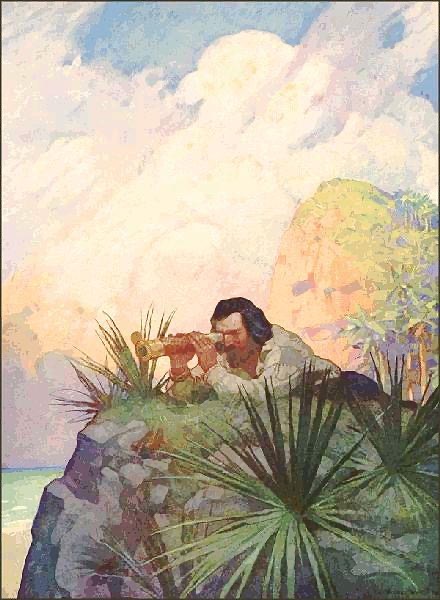Distantcing

N.C. Wyeth: from Robinson Crusoe, Cosmopolitan Book Corporation edition (1920)
" … I feel as though I am still free floating …"
©2022 by David A. Schmaltz - all rights reserved
Between my career and our grand exile, I grew accustomed to being away from home. I always felt as though I adapted well to road life, but I see that I will most likely be more tied to one place, our Villa Vatta Schmaltz, in the future. Not even Our Damned Pandemic sequestered me at home at first, for it arrived at the start of our last year of exile, stranding me in our final interim home rather than what The Muse and knew to be our real one. Finally arriving home, I hardly knew how to comport myself. I'd been short-timing myself for so many years by then that I'd become more attached to my shadow than to my actual presence. You see, as a passing entity, one gets excluded from many of the rights and obligations of full citizenship. One votes, of course, in local elections, even if on exile, but one probably does not feel as though they're contributing to any personal future by so doing, since the one certain thing always remains that you will not still be there by then. On exile, one never possesses a local future, only a far away one, and only then if lucky. One forfeits a full present local identity for the duration of exile duty.
Washing up back home felt both enormously relieving yet also deeply disturbing, for I'd grown accustomed to the emotional as well as the physical Distantcing. I could before blithely discount the present, knowing that it didn't represent where I really lived, where I really existed, in favor of a future ideal of who and what I 'actually' entailed. I suppose I maintained a rather snobbish attitude, as if none of any of it could possibly be my fault, since I wasn't from there and was also destined to leave. I lived a Just Visiting life, not in jail and also not actively engaging in local civic and economic activity, just an observer and an only distantly interested one. From that perspective, the locals seemed like suckers, scratching out their existences in a place not nearly up to the snuff we were destined to inherit. I could live in the smug certainty that I was destined for better whatever the complications. The Muse and I became renters, only owning our true home long distance, as landlords of our future. We'd escape 'back home' for a couple of weeks each year to pretend as though we belonged before heading back toward the sunrise again, always, always, always heading in the wrong direction. Even we understood that every decent Western left the heroes riding into the sunset.
I became proficient in those skills one need never develop at home. I could sniff out replacements. At home, one comes to know where to go to satisfy any desire. Out there, it's hollower. Even with The Web, tracking down some supplies proves impossible. I noticed that nobody ever goes back to delete the website when a physical store closes. In Northern Virginia, Arlington once hosted a classic hardware store with oiled wooden floors and innumerable mysterious bins, a classic anyone would welcome walking into. It took me months, once we'd landed there on exile, to finally accept that that place no longer existed. I eventually imprinted on another hardware store, which I gladly frequented for the duration of our stay, though I knew it was not quite what I remembered from home. While I was reveling in that find, the one back home went out of business. In many instances, I managed to find better than I'd ever known at home, so, returning, I missed the replacements. I some days wonder if I might not have been better off if I'd never roamed. I know a hot dozen great bread bakeries, but I'm only ever very close to one, and it's closed on Mondays and Tuesdays. Home ain't what it seemed when I was occupied dreaming about it full time.
There might not be any role less responsible than that of the traveller. Early in my career as an exile, I lived in a small city in Northeastern Pennsylvania, a place just three driving hours outside of New York City. We drove into the city as often as we could, but many of our friends and neighbors there had never made the excursion and swore that they never would. Why, one asked, would I drive to somewhere where they'd make me pay for parking? I tried to plead cultural influences, MOMA and The Metropolitan, but my suggestions fell on deaf ears. They were where they belonged and so sought nothing different. Unlike me, they understood where they belonged. My life has been less anchored, though I'm lately and decidedly late in life, attempting to settle down. The tail end of Our Damned Pandemic has perhaps eased the transition, since I felt almost as sequestered when returning as I had when away and pining, and I have not yet really anchored myself back. I feel as though I am still free floating, a prisoner of perennial Distantcing from friends, family, and home, even after returning. It is not as I remembered it, but only because it isn't. I was one of those kids destined, I guess, to move away from home then spend my life dreaming of being back where I came from, Distantcing.


